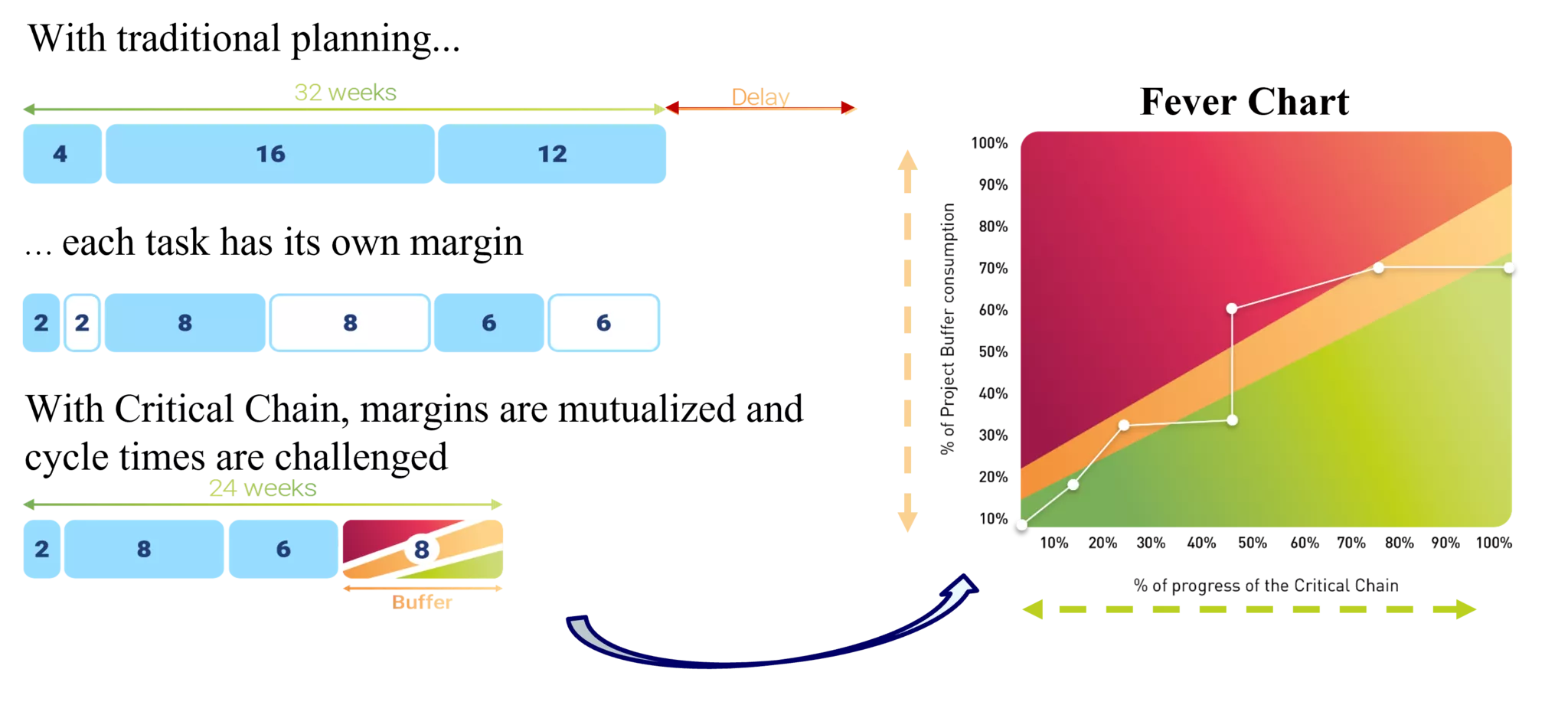Theory of Constraints, Critical Chain Project Management, Lean : industry consulting & training - Marris Consulting
Critical Chain Project Management, an innovative method to successfully finish your projects on time
Overview of the Critical Chain approach
Most of the projects traditionally managed with the Critical Path Method (CPM) or the Program Evaluation and Review Technique (PERT) suffer from time and budget overruns of 50 to 200%, and original specifications have to be abandoned.
Critical Chain Project Management (CCPM) has shown over the last 10 years, that performance can be significantly improved.
The approach is based on 3 major principles: to break the unhealthy policy of commitments on the dates of completion of each task, to plan the projects by considering the true capacity of the resources and to focus the management on what is critical - what determines the performance of the project - the "Critical Chain".
Critical Chain is different from the critical path:
- the way tasks are estimated is different: you estimate durations without margins.
- instead of protecting each and every task with a safety margin, the project is protected from uncertainty with a big project buffer,
- feeding buffers are inserted to protect the Critical Chain from delays on non-critical tasks,
- the project, or projects in multi-projects environments, are monitored with the “Fever Chart” allowing management to have a clear picture of the projects' status,
- resources on the Critical Chain are protected from multitasking,
- the "Student syndrome" (to postpone a task until the last moment) is minimized by encouraging frequent updates,
- the relay race principle is promoted, and the resources working on the Critical Chain are identified with a mascot.
Critical Chain Project Management (CCPM) allows projects to be finished on time, within budget and without compromises on the original specifications. Moreover, we notice an extraordinary increase in project performance, an increase in resource productivity and a better working environment.
Dowload the full point of view by Philip Marris on CCPM:
Documents to download
List of worldwide CCPM implementation references

Links of interest
More articles on Critical Chain Project Management
Aeronautics: Critical Chain Project Management and operational excellence leave the nest
Marris Consulting, experts in Critical Chain Project Management (CCPM)
Marris Consulting is an expert company in the implementation of Critical Chain Project Management (CCPM). We offer both project management consulting & CCPM training sessions. With a unique knowledge and a recognized experience, our industry consultants guide you through the Critical Chain method, for a significant improvement in the performance of your projects.
Critical Chain Project Management is a proven approach to successfully completing projects on time, without budget overruns and without compromising the original specifications. However, for optimal results, CCPM must be properly implemented and project models properly constructed. Most of the time, companies do not have the necessary resources and tools to properly exploit the Critical Chain method in Project Management. Thanks to cutting-edge know-how acquired over many years of experience, our operational excellence consultants will provide you with the shortest and most optimized path to a complete rollout of the Critical Chain approach. With Marris Consulting's Critical Chain Project Management consulting and training services, you will witness a real transformation in your project productivity and timelines.
For more information about our CCPM consulting and training services, please do not hesitate to contact our experts.
Why use the Critical Chain Project Management method?
The Critical Chain Project Management (CCPM) method should be employed for several key reasons.
One major advantage of CCPM is its ability to account for uncertainties and variability in project tasks. Traditional project management methods often estimate task durations with a margin, leading to artificially inflated timelines. CCPM, on the other hand, recognizes that not all tasks will take the maximum estimated time and leverages this knowledge to create a more realistic project schedule. By utilizing a time buffer at the end of the project instead of within individual tasks, Critical Chain Project Management provides flexibility while still safeguarding project completion.
Another key benefit of CCPM is its emphasis on resource optimization. With traditional project management, resources are often over-allocated or spread too thin across multiple projects, leading to inefficiencies and delays. The Critical Chain method focuses on identifying and resolving resource constraints to ensure that critical tasks receive the necessary resources when they are needed and avoid bad multitasking. This approach maximizes resource utilization and improves overall project efficiency.
Furthermore, Critical Chain Project Management encourages collaboration and communication among project team members. By emphasizing the shared goal of project completion and the importance of task dependencies, the CCPM methodology fosters a more cooperative and integrated project environment. This collaborative approach increases transparency, reduces conflicts, and facilitates effective problem-solving.
To conclude, the Critical Chain approach in project management offers advantages such as efficient project scheduling, improved resource utilization, enhanced flexibility, and increased collaboration. By adopting the Critical Chain Project Management method, organizations can overcome common project management challenges and achieve greater success in their projects.
About Marris Consulting
Marris Consulting is an industry consulting and training company specialized in the Theory of Constraints (ToC) and Critical Chain Project Management. We focus on improving the performance of manufacturing and process industries by using Constraints Management combined with Lean and Six Sigma. To boost project performance, we also use Critical Chain Project Management (CCPM), which we sometimes combine with Lean Engineering. Our 2-day performance audits, our performance consulting services and our project management, Lean, ToC & CCPM training by our industry consultants offer a wide range of solutions to help our clients around the world reach the highest possible levels of performance.



